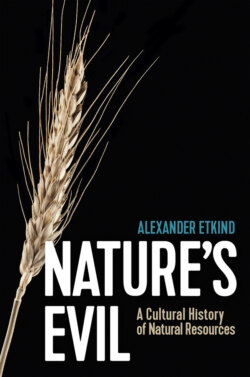Читать книгу Nature's Evil - Alexander Etkind - Страница 25
War and potatoes
ОглавлениеThe revolution in European agriculture occurred only when America and the most important of her treasures, the potato, were discovered. Following the example of the Incas, the Spanish fed potatoes to the workers in the silver mines of Potosí. Their ships carried potatoes back to Europe. Accustomed to the purity of grain, European farmers were appalled by the dirty, oddly shaped potato. In France, people believed it caused leprosy, but in other places it was thought to be an aphrodisiac. In Ireland, the potato appeared just when the English were colonising the country in the sixteenth century. Walter Raleigh may have introduced it there himself. In 1594 he had been looking for gold in South America; when he failed to find it, he wrote a book about Eldorado. Queen Elizabeth gave him tobacco plantations in Virginia and estates in Ireland, which were also called plantations. In 1602 Raleigh sold his Irish plantations to Richard Boyle, the father of the famous chemist. Potatoes were already being grown there on a massive scale. The Catholics rebelled, the English suppressed the uprisings, and the Irish discovered the strategic superiority of the potato. The enemy trampled down your crops and stole the grain from your barns, but the humble potato continued to lie in the ground waiting for its rightful owner.
Potatoes contain seven times more moisture than wheat and are therefore prone to rot. This made potatoes beneath the notice of the Exchequer and saved millions of peasants. An acre of potatoes could feed ten people, five times as many as an acre of wheat. Having discovered potatoes on his own land, Frederick II forced his farmers to plant potatoes on their fallow fields. As a result, the peasants consumed less grain and paid more taxes. The population increased thanks to the potato, and this was a long-standing aim of the Prussian crown. The potato helped Prussia to survive its multiple wars.17 Following Frederick’s example, European monarchies introduced the potato throughout Northern Europe. Potatoes and crop rotation were the key reasons for the population explosion in Europe in the nineteenth century. Diseases in cereals are quite different to those in potatoes, which helped to stabilise the harvests. Without the potato there would have been no urbanisation and no industrial revolution. In the 1830s, in the central Russian provinces, peasants rioted against the potatoes that landowners imposed on them in order to get more revenue from their ‘empty lands’. In contrast, in Ireland the landowners complained about ‘the idleness of peasants’, which they explained by the easy productivity of their potatoes. Undoubtedly, potatoes in the ground saved the peasants from starvation in a bad year. Perhaps that is why Soviet collectivisation led to a worse famine in the black soil, grain-growing regions of Ukraine than in northern Russia, where more vegetable crops were grown. Across Europe, potato growing increased the area of land under cultivation by a whole quarter. Then the introduction of tractors and motor vehicles released another quarter of the land which had been used for feeding horses. Agricultural expansion kept pace with industrial expansion.
